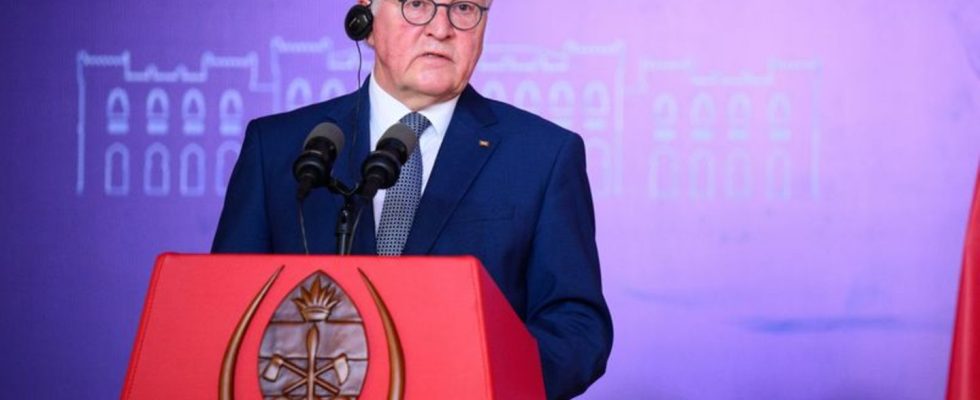Federal President
Steinmeier in Tanzania: Coming to terms with the colonial past
Federal President Frank-Walter Steinmeier wants to “work through the dark chapter” together. photo
© Bernd von Jutrczenka/dpa
Germany and Tanzania want to look into the future together – Federal President Steinmeier and President Hassan made this clear in Dar es Salaam. But they are also dealing with a dark chapter.
Germany and Tanzania want to further expand their relationships and also come to terms with their shared colonial past.
“We are ready to start official negotiations to see how we can deal with the colonial legacy in our country,” said Tanzanian President Samia Suluhu Hassan in Dar es Salaam after a meeting with German President Frank-Walter Steinmeier.
He emphasized: “It is important to me that we come to terms with this dark chapter, that we work through it together.” Germany is also prepared to repatriate cultural assets and human remains.
Up to 300,000 people killed
Tanzania was part of the German East African colony until the end of the First World War. Colonial rule was characterized by oppression, exploitation and atrocities. According to Tanzanian estimates, up to 300,000 people were killed in the so-called Maji-Maji War between 1905 and 1907. Many skulls and bones are still in German museums today. There are families waiting for the remains of their beloved ancestors, Hassan said. Steinmeier will be the first German state representative to meet such relatives this Wednesday.
The Tanzanian president emphasized that both countries have been working well together for 60 years and that the federal government is a “reliable friend and partner.” According to Steinmeier, the aim is to strengthen these good relationships and “make them future-proof”.
Tanzania wants to strengthen economic cooperation
Above all, Hassan wanted more economic cooperation. “There is still potential to expand trade and investment.” This also applies to the tourism sector. A lot of German tourists are already coming to your country. “But there is still potential to increase the numbers there too.”
Steinmeier emphasized: “I hope that this trip will provide an impetus for our economic relations.” The Federal President is accompanied by a business delegation that wants to explore the opportunities for new business.
Steinmeier praised the path taken by Hassan to strengthen democracy and the rule of law. “This is all the more to be admired and respected as we both live in a world in which democracy and democratic structures have come under increasing pressure.” Steinmeier assured Hassan: “Germany, the federal government will be happy to support you on this path of domestic reforms.”
Hassan has only been in office for around two and a half years and is the only female head of state with government power on the African continent. From Berlin’s perspective, the 63-year-old is a bearer of hope. After the autocratic course of her predecessor John Magufuli – who earned the nickname “Bulldozer” – she chose a more liberal path. For example, the ban on demonstrations that had been in place for years was lifted. However, human rights organizations such as Amnesty International criticize that there are still significant deficits in areas such as freedom of the press and freedom of assembly – something that is seen in a similar way in Berlin.
Tanzania is about two and a half times larger than Germany, but with around 65 million inhabitants, it has significantly fewer people. The country is considered politically stable and has one of the strongest economies in the sub-Saharan region. Tourists come mainly because of the Serengeti National Park and Kilimanjaro, which is the highest mountain in Africa.

